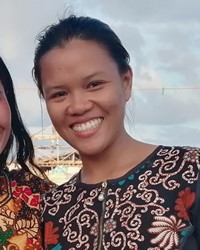Sama, Central in Malaysia

Photo Source:
Reigthzhyl Zrcn
|
Send Joshua Project a map of this people group.
|
| People Name: | Sama, Central |
| Country: | Malaysia |
| 10/40 Window: | Yes |
| Population: | 23,000 |
| World Population: | 162,000 |
| Primary Language: | Sama, Central |
| Primary Religion: | Islam |
| Christian Adherents: | 1.00 % |
| Evangelicals: | 0.50 % |
| Scripture: | New Testament |
| Ministry Resources: | Yes |
| Jesus Film: | Yes |
| Audio Recordings: | Yes |
| People Cluster: | Filipino, Muslim |
| Affinity Bloc: | Malay Peoples |
| Progress Level: |
|
Introduction / History
The Sama people groups, who live in the East Malaysian state of Sabah, are officially classified under Bajau. The Bajau are predominantly Muslim peoples. They speak as many as seven different mother-tongue languages which belong to what is known as the Sama-Bajau subgroup of Malayo-Polynesian languages.
The Sama people groups are generally referred to in Sabah as the East Coast Bajau. The government does not distinguish one Bajau group from the other. While outsiders call them Bajau, they most commonly refer to themselves as Sama.
Most of the Sama peoples originated from the Sulu Archipelago in the Philippines. Their languages comprise a complex chain of dialects, most of which can be identified with Sama languages spoken in the Philippines. The Sama languages can be divided into three subgroups: the Northern Sama, the Southern Sama, and the Central Sama.
Sama settlements are found mainly along Sabah's eastern coastal area and particularly in Tawau, Semporna, Lahad Datu, and Sandakan districts. One Sama settlement is located away from the east coast on the Gaya Island of Kota Kinabalu. Many of the Sama peoples of Sabah maintain close association with the Bajau peoples of the Sulu region as boat travel is relatively easy and common throughout the region.
What Are Their Lives Like?
The majority of Central Sama are still sea oriented. Many continue to derive their livelihood primarily from the sea. Fishing is their major economic activity besides seafaring trade and some farming. Copra is the major cash crop, though copra holdings are small. Trade comes in the form of dried fish, sea cucumbers, pearls, pearl shell and other marine items.
Sama settlements on stilts sit directly over the sea or along well-protected stretches of shoreline. Houses are crowded together in great numbers and are connected by narrow wooden bridges. Each house usually has one rectangular room with an attached kitchen. Households are grouped into larger units based on location and family ties.
What Are Their Beliefs?
The Central Sama are predominantly Sunni Muslims. Islamic practices, such as fasting during Ramadan, are closely observed. Daily prayers at the prayer room ('surau') and the weekly Friday prayers in the mosque are performed. Many, however, still participate in religious practices that have been retained from traditional customs. For instance, spirits of the dead are thought to remain in the vicinity of the graves, requiring expressions of continued concern from the living. They believe that Allah permits the annual return of dead souls to the earth. They honor these souls by cleaning their graves and by offering special prayers in some kind of Islamic context such as the reading of Arabic prayers.
What Are Their Needs?
Many of the Central Sama people live below the poverty level. They need help especially in the areas of health and drinking water.
Better infrastructure in the areas of education and transportation is also needed.
Prayer Points
Ask God to send people to help the Sama with these needs and be a channel of God's love and blessing. The Scriptures are available in the Sama languages; pray that the Sama will have access to them.
Pray for the Holy Spirit to give the Sama Bajau people teachable and understanding hearts.
Pray that a strong movement of the Holy Spirit will bring entire Sama Bajau families into a rich experience of God's blessing.